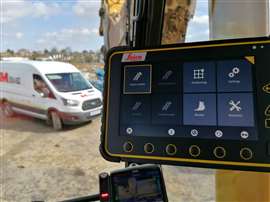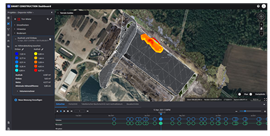Why software subscriptions are a growing trend in construction
20 July 2023
SaaS, or Software as a Service, is a cloud-based method of providing software to users. SaaS users subscribe to an application and can then log in and use a SaaS application from any compatible device over the Internet.
 Richard Clement says software subscriptions can negate the need to invest in specific hardware and software installations. Photo: Smart Construction
Richard Clement says software subscriptions can negate the need to invest in specific hardware and software installations. Photo: Smart Construction
Software as a Service offers many advantages to the construction industry, including reducing workload, improving productivity and recruitment, minimising costs and also mitigating risks at the job site.
With the digital transformation upon us, the time is now to harness these capabilities and bring digital solutions to the fore across the construction industry, revolutionising the way we think of the job site.
Digitising the construction industry
By collecting data and converting it into valuable information, SaaS applications enable the safe and accurate management of labour, machines & material, which in turn optimises working conditions and enhances profitability, making businesses more successful.
At ground level, this can look like reducing idle times for machines by analysing where the longest wait time is captured, ensuring payload is being used in an efficient way and that the machines deployed for the work are the optimal choices, or improving fuel efficiency of machines and site staff.
 Terrain mapping with Smart Construction Dashboard. Image: Smart Construction
Terrain mapping with Smart Construction Dashboard. Image: Smart Construction
It can also translate into less time on the road for contractors and managers, with information derived from jobsite data affording them the opportunity to make decisions based on insight and information straight from the site itself.
Increasing productivity
Because of current lead time in information creation & monitoring, there is often time wasted at the job site while decisions are processed and relayed.
SaaS applications increase the speed at which information is relayed from the site to office and the response, aiding informed decision making and negating the need for excessive commuting and communication.
By digitally transforming the job site, site managers and leaders who work across sites will have more flexibility within their work, which in turn will reduce delays in information availability.
 Richard Clement, deputy general manager of Smart Construction. Photo: Smart Construction
Richard Clement, deputy general manager of Smart Construction. Photo: Smart Construction
With improved digitisation comes more efficient processes and the ability to make decisions based on precise insight and data analysis, which increases productivity for the team on the ground.
Additionally, SaaS negates the need to invest in more specific hardware and software installations, allowing business-wide access to applications with more ease.
Additional backups and other services also take up valuable time within the team which could be used elsewhere.
SaaS in practice
We’re already seeing the introduction of digital technologies across the construction industry and as an industry we need to encourage their optimisation.
SaaS within construction should be a primary focus for investment and development over the coming years.
Construction as a whole hasn’t developed at the same rate as other industries and outdated practices are now ready for a refresh. Putting it simply, there is a wealth of benefits digitisation can bring.
Technology providers are working with clients and partners to answer the need for improved efficiency across the industry. This technology includes rapid data processing to create digital twins of the job site, which can inform decision making at all levels.
This can include improving planning and design insights, collecting data and converting it into valuable information, and aiding construction businesses to accurately manage manpower, machines and materials.
This provides safer and easier working conditions which will create successful and efficient construction sites.
This is the start of a digital future for the industry, and SaaS can digitally transform not only specific job sites but the industry as a whole.
|
Further information Smart Construction is an approach to the digital transformation of earth moving, utilising both innovative devices and SaaS designed to digitise and streamline the modern-day job site, developed by the expert team at Komatsu. For more information about Smart Construction and its solutions range, visit smartconstruction.io |




